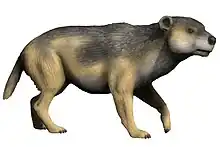Cephalogale
Cephalogale is an extinct genus of hemicyonine bear which lived in the Oligocene and Early Miocene epochs in North America and Europe. It lived from around 28.4—20.0 Mya. Before it was reconsidered to be close to the ancestry of hemicyonines, Cephalogale was once considered to be an ancestor of all bears.[1]
| Cephalogale Temporal range: early Oligocene to Miocene | |
|---|---|
 | |
| Life reconstruction of Cephalogale shareri | |
| Scientific classification | |
| Domain: | Eukaryota |
| Kingdom: | Animalia |
| Phylum: | Chordata |
| Class: | Mammalia |
| Order: | Carnivora |
| Family: | Ursidae |
| Subfamily: | †Hemicyoninae |
| Genus: | †Cephalogale Jourdan, 1862 |
| Type species | |
| †Cephalogale geoffroyi Jourdan, 1862 | |
| Species | |
|
†C. shareri (Wang, et al., 2009) | |
Fossil distribution
- Dětaň, Czech Republic about 33.9—28.4 Mya
- Cetina de Aragon, Spain about 22.4—20 Mya
- Standing Rock Quarry, Zia Sand Formation, Sandoval County, New Mexico about 24.8—20.6 Mya
- Agate Springs Quarries, Sioux County, Nebraska about 23–5.3 Mya
- Hemingford Quarry 12D, Runningwater Formation, Box Butte County, Nebraska about 20.6—16.3 Mya

Cephalogale dentition, Saint-Gérand-le-Puy (Allier, Auvergne, France)
References
- McLellan B. & Reiner D. C. (1994). "A review of bear evolution". Int. Conf. Bear Res. and Manage. 9(1): 85-89. PDF
This article is issued from Wikipedia. The text is licensed under Creative Commons - Attribution - Sharealike. Additional terms may apply for the media files.